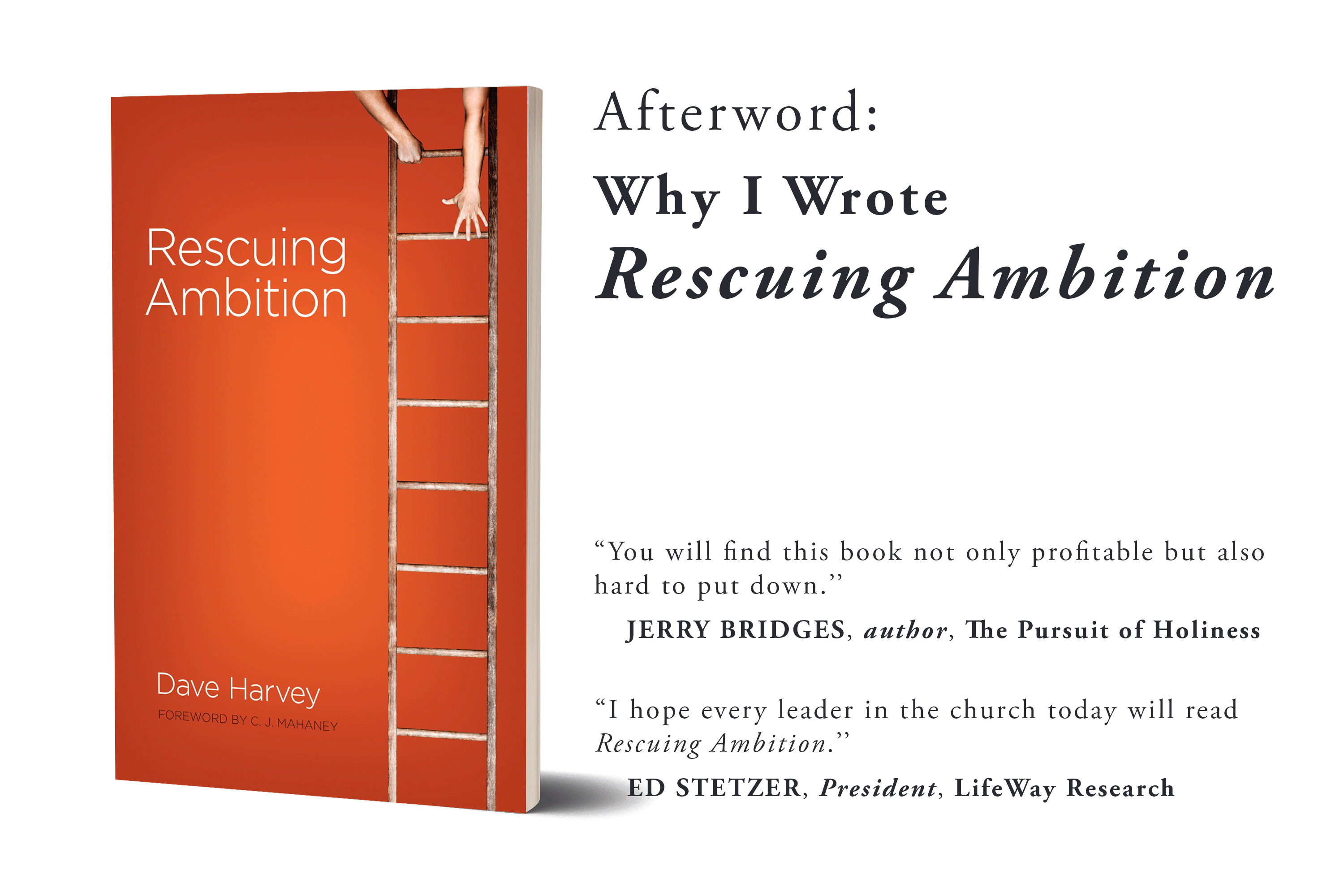Speaking of ambition . . .
My ambition to write this book took shape over two decades of ministry as I observed a quirky awkwardness among Christians when it came to this topic.
There were the mover-and-shaker types who seemed driven by ambition—perpetually dissatisfied, always hoping the next ministry, job, or status symbol would bring fulfillment. But don’t call them ambitious—them’s fighting words.
On the other side were the laid-back types—people whose impact never seemed to match their talents and gifts. They knew they had potential, but just never seemed to know what to do with it.
Everybody else just seemed confused. I guess I was one of those. Guys like me wanted to do great things, but we didn’t trust our motives, so we were paralyzed because we didn’t want to do things for the wrong reason. We live in a kind of guilty frustration, knowing that opportunities abound, but time’s running out.
I also discovered that ambition is sort of like sex. It’s supposed to be an expression of who we are as human beings, but in many people’s experience it turns into, well, guilty frustration. Ambition seems to have an important function, but it gets complicated in real life. Just like sex.
Before I risk overplaying the “ambition like sex” comparison, let me tell you how the two are different. Check your local bookstore. In contrast to sex, which drives more publishing than any topic in the galaxy, there’s practically nothing on ambition. Seriously, nada. I tried to find it, but it isn’t there. You rarely even find the subject mentioned in business books anymore. Sex sells; ambition apologizes for even showing up.
There are, of course, lots of qualities orbiting close to ambition that people don’t mind having—competitiveness, assertiveness, and being goal-oriented, to name a few. We admire people who have aspirations in life. Psychological studies list terms like “achievement motivation” and “drive for growth and mastery” as desirable traits in human development. But call somebody ambitious, and you might as well call him or her an amoral, me-centered, backstabbing, social climbing, power-hungry prima donna. And if you want to stop a prayer meeting cold, just raise your hand and ask folks to pray that you’ll be more ambitious in life. I wouldn’t recommend this.
Frankly, it would have been a lot easier to write a book called Ambition Denied or How to Succeed without Having to Be Ambitious. But it’s my conviction that ambition shouldn’t be left to drown in its bad reputation. There’s so much more to ambition than dictators and power-hungry bosses. I trust you’ve come to the end of this book seeing clearly that ambition is something with a deeply biblical purpose. That’s why I think God wants us to join him in this rescue effort. Ambition needs to be set free and put back in play with biblical conviction and gospel clarity.
A Long Struggle
In my research for this book, I found that the struggle with ambition isn’t new. Christians have been uncomfortable with it since Bible times. Why? I think it’s primarily because in pursuing ambition—as in pursuing sex and money—we inevitably find ourselves wandering into the fields where the world plays. Ambition is active; it throws you into real-time, nitty-gritty interaction with the world around you. That’s the way it’s always been.
Here’s the big picture: ambition is something God intends for good (as we’ve seen in this book), but it’s easily corruptible. In fact, when it’s corrupted, it’s plutonium, positively glowing with depravity.
That may be why ambition took a mortal blow early in Christian history and never fully recovered. Among the church fathers, ambition was dogged by an assumption of sin. That view later spilled over into Western culture at large, which for centuries was heavily influenced by the church. Ambition became synonymous with the love of earthly position and honor. It meant vainglory, fame-hunting—radioactive stuff.
Understandably, respected voices throughout history decried it. In his Confessions, Augustine called ambition “only a craving for honour and glory.” John Calvin termed it “the most slavish of all dispositions.” The prevailing sentiment was summed up well by Shakespeare in Wolsey’s words to Cromwell in Henry VIII: “I charge thee, fling away ambition: By that sin fell the angels.”
Despite the bad press, ambition of the worldly kind continued to flourish. It drove men and women to build empires, launch endless rounds of wars, and climb hierarchies of power (even in the church).
Of course, the cleaner form of ambition didn’t simply vanish all the while. Sometimes this appropriate ambition was notably evident. Combined with an entrenched religious morality, it sparked needed social advances and government reform—it even aided in the spread of the gospel throughout the world.
In the 1800s, Spurgeon would speak of two kinds of ambition. There was the good kind: “the desire to use one’s capacities to the fullest, especially for God’s Glory and the good of our fellow creatures.” There was also the kind Christianity had always condemned: “that craving for so-called ‘glory’ which makes a man court the homage of his fellow men, and which will not let him be content unless he is set up on a high pedestal for fools to stare at!”
Spurgeon would also urge believers to pray for “a nobler ambition than that which possesses the common Christian—that you may be found faithful unto God at the last, and may win many crowns for your Lord and Master.”
But since Spurgeon’s days, the ambition picture has only gotten murkier. It happened as societies and cultures were increasingly redefined and redirected away from a God-centered view of life toward a man-centered perspective and as Scripture was supplanted by human reason as the source of authority.
More recently, postmodernism has brought a culture-wide denial of any objective truth or authority. And that has rapidly eroded the ground that’s needed under ambition. It has practically killed the kind of ambition that promises a hopeful future, since “to be ambitious is to be future-minded.” Ambition gets us dreaming about what life might look like if we apply ourselves. It points us forward and invites us to aspire to something not yet seen.
Ultimately only our belief in objective truth—and the hopeful journey toward it—can produce individuals and societies who are courageous, industrious, and enterprising. Without it, we slide into what D. A. Carson calls “a world without heroes.” Where objective truth is denied—where there’s no meaning, no greater truth, nothing bigger than ourselves—ambition suffocates. Progress and community give way to apathy and self.
Nobody set out to murder ambition. But that was the effect. While many in previous generations were often driven by selfish ambition, today we face a different issue—a generation of young men and women missing the adventure of aspiration. Transcendent vision is lost. The engine of ambition lies silent.
Not long ago I heard a radio interview with a Christian college professor contrasting college students today with those of the past. Decades ago incoming freshmen were marked by their pride—they could (and would) become the leaders, the change agents, the innovators for industry, government, and commerce. Their ideas would influence society and determine the course of civilization. It was class after class of proud, hungry, ambitious students.
But over the years the professor detected a distinct shift. Freshmen classes morphed into something else. Gone was the drive to succeed—to aspire to a better life. Replacing it was only the impulse for simple comfort. The professor related how many in this generation have drives and dreams reaching no further than their own ease. There’s no cause gripping them, no quest inspiring their imagination. It’s not simply the loss of initiative. It’s that ambition itself is on life support and gasping for breath.9
Colleges aren’t the problem; they simply reflect the problem. In a culture fogged over by postmodernism, sadly drive, reason, and argument lie dormant. The future isn’t intentionally snuffed out; postmodernism just hangs a “Do Not Disturb” sign over doors of opportunity.
Few risk the hassle of knocking. Fewer still exert the energy to walk expectantly through the door. We go get a latte instead.
Reclaiming the Future
Unknowingly influenced by these cultural trends, the church is undergoing a slow, painless atrophy. The organ of ambition—the God-implanted drive to improve, produce, develop, create, do things—is neglected and well on its way to paralysis. For some Christians, dreams are numbed. For others, there are no dreams; life just happens.
Os Guinness says it this way:
On the one hand, we are told by a myriad of Christian speakers that we should be thinking about our legacy—the clear knowledge of our contribution after our time on earth. On the other hand, we are told by countless other Christians that ambition is always wrong; synonymous with egotism, it is selfish and quite un-Christian. Both of these positions are wrong. In fact, they are the opposite way around. For as followers of Jesus we can and should be ambitious, but we should never be concerned with our legacies.
To recover this ambition that Guinness says we “can and should” have is the reason I’ve written this book. I wrote it because I don’t want the past robbing us of the future. I don’t want the people I love and the people you love to be conformed to the world’s way of thinking about today and tomorrow.
As Christians, there’s much in the past that we love, but we’re also called to the future. It’s a future secured by the cross and commissioned by the Savior. A future both given and grabbed, protected and pursued. It’s our future if we dare to believe God’s promises.
That future is too important to put off until tomorrow. We must dream about it today.
I believe God wants ambition back in our understanding of godliness and spiritual health. Sure, let’s not fail to evaluate our motives and strive for humility—that’s essential. But let’s not be paralyzed by self-analysis.
God calls us to “run with endurance the race that is set before us” (Heb. 12:1). He calls us to run it in such a way that we win the prize (1 Cor. 9:24), to forget what lies behind and strain forward to what lies ahead (Phil. 3:13), to invest our talents wisely (Matt. 25:14–30), and to be a people “zealous for good works” (Titus 2:14). Those are biblical ways to exclaim, “Keep the pistons of ambition pumping for God!”
Let’s not just kick-start a conversation. Let’s move into the future expecting that God can use us to make a difference.
That’s why I wrote this book.












